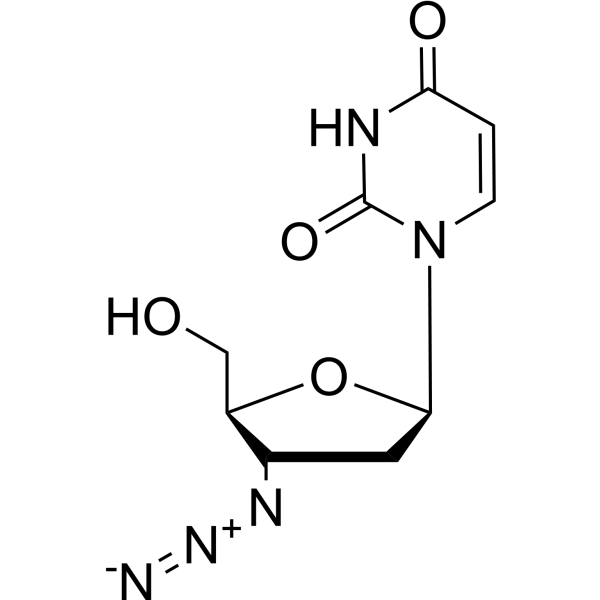
Navuridine
CAS No. 84472-85-5
Navuridine( AZdU | AzUrd | CS-87 | 3'-Azido-2',3'-dideoxyuridine | CS 87 | AZddU )
Catalog No. M27413 CAS No. 84472-85-5
Navuridine is an oral active inhibitor of HIV reverse transcriptase with a relatively short half-life.
Purity : >98% (HPLC)
 COA
COA
 Datasheet
Datasheet
 HNMR
HNMR
 HPLC
HPLC
 MSDS
MSDS
 Handing Instructions
Handing Instructions
| Size | Price / USD | Stock | Quantity |
| 5MG | 61 | Get Quote |


|
| 10MG | 106 | Get Quote |


|
| 25MG | 222 | Get Quote |


|
| 50MG | 353 | Get Quote |


|
| 100MG | 533 | Get Quote |


|
| 500MG | 1152 | Get Quote |


|
| 1G | Get Quote | Get Quote |


|
Biological Information
-
Product NameNavuridine
-
NoteResearch use only, not for human use.
-
Brief DescriptionNavuridine is an oral active inhibitor of HIV reverse transcriptase with a relatively short half-life.
-
DescriptionNavuridine is an oral active inhibitor of HIV reverse transcriptase with a relatively short half-life.
-
In Vitro——
-
In VivoPharmacokinetic Parameters of 3′-Azido-2′,3′-dideoxyuridine in male Sprague-Dawley rats. Animal Model:Adult male Sprague-Dawley rats (300-400 g)Dosage:25, 100 mg/kg Administration:Intravenous bolus injection or oral gavage (Pharmacokinetic Analysis)Result:The oral bioavailability estimates of 3′-Azido-2′,3′-dideoxyuridine at doses of 25 and 100 mg/kg averaged 53%.
-
SynonymsAZdU | AzUrd | CS-87 | 3'-Azido-2',3'-dideoxyuridine | CS 87 | AZddU
-
PathwayMicrobiology/Virology
-
TargetHIV
-
Recptor——
-
Research Area——
-
Indication——
Chemical Information
-
CAS Number84472-85-5
-
Formula Weight253.218
-
Molecular FormulaC9H11N5O4
-
Purity>98% (HPLC)
-
SolubilityIn Vitro:?DMSO : 250 mg/mL (987.32 mM)
-
SMILESOC[C@H]1O[C@H](C[C@@H]1N=[N+]=[N-])n1ccc(=O)[nH]c1=O
-
Chemical Name——
Shipping & Storage Information
-
Storage(-20℃)
-
ShippingWith Ice Pack
-
Stability≥ 2 years
Reference
1.Fang Liu, et al. N-3-oxo-octanoyl-homoserine lactone-mediated priming of resistance to Pseudomonas syringae requires the salicylic acid signaling pathway in Arabidopsis thaliana. BMC Plant Biol. 2020 Jan 28;20(1):38.
molnova catalog



related products
-
Tenofovir alafenamid...
Tenofovir alafenamide fumarate (TAF) is an oral phosphonoamidate prodrug of the HIV reverse transcriptase nucleotide inhibitor tenofovir (TFV).
-
Darunavir ethanolate
A potent, selective HIV-1 protease inhibitor that is extremely potent against laboratory HIV-1 strains and primary clinical isolates with IC50 of 3 nM, IC90 of 9 nM.
-
Limonin
Limonin is a limonoid, and a bitter, white, crystalline substance found in citrus and other plants. It is also known as limonoate D-ring-lactone and limonoic acid di-delta-lactone.



 Cart
Cart
 sales@molnova.com
sales@molnova.com


